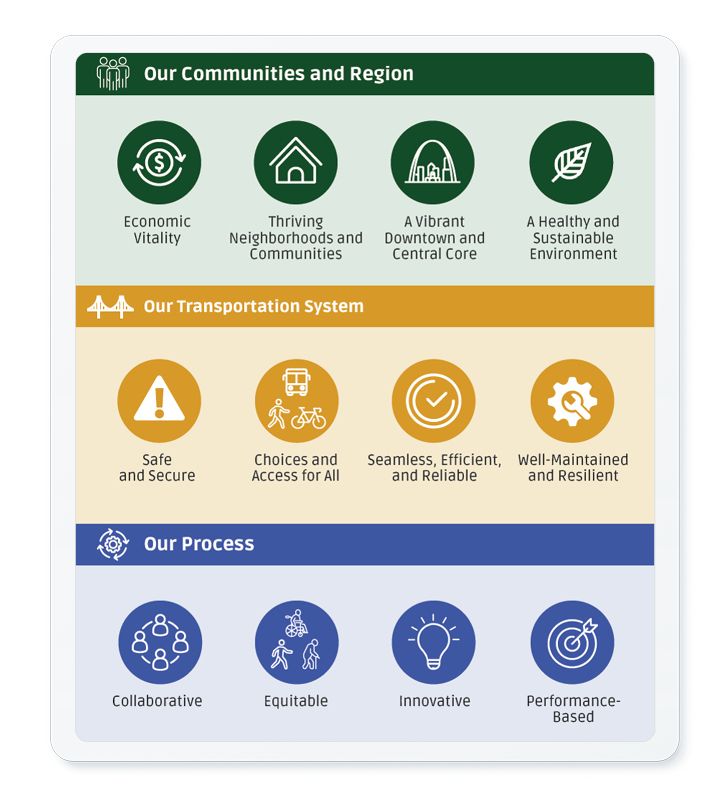Updating the St. Louis region’s long-range transportation plan
We helped the East-West Gateway Council of Governments (EWG) define Guiding Principles and performance measures for its long-range transportation plan and conducted a transportation assessment to help guide future investments in the St. Louis region.
We supported the East-West Gateway Council of Governments—the metropolitan planning organization for the St. Louis region—in updating the Connected 2050 long-range transportation plan, embedding new priorities to strengthen transit and regional mobility.
Challenge

To establish a vision and priorities for the future of the regional St. Louis transportation system—including highways, bridges, public transit, bicycle, and pedestrian routes—EWG undertook a focused effort to update the region’s Guiding Principles which serve as the foundation for its transportation plan. For more than a decade, EWG used a set of 10 Guiding Principles as a basis for its long- and short-range planning. Recognizing changing aspirations for the region, EWG wanted to ensure that its new Connected 2050 plan reflected current goals. Aware that the region has varying levels of access to transportation services compared to peer regions, EWG also needed to explore different transportation strategies. In doing so, they wanted to understand how past transportation investment decisions influenced outcomes for different population groups, evaluate how the system currently serves the needs of residents, and develop recommendations to ensure that transportation works for everyone.
Solution
We developed an extensive engagement process to gain input from residents and stakeholders throughout the St. Louis region on what matters most to them. Through interviews, focus groups, pop-up events, surveys, virtual open houses, and more, we gathered input to help define a set of Guiding Principles that reflect the values of the region. Working collaboratively with EWG staff, we facilitated dialogue to help establish these Guiding Principles, developed performance measures for tracking regional progress, and established a process for scoring and prioritizing projects for inclusion in the long-range plan.
We also conducted a transportation assessment that addressed three key components: a historical analysis of investments and policies; an assessment of current mobility, transportation safety, and environmental conditions in relation to different population groups; and an analysis of transportation investments. Through the public engagement processes and input from an Advisory Group, we gained insight into the transportation challenges faced by residents, employers, human service providers, and others. We also utilized geospatial analysis of data to explore transportation outcomes across different geographies and populations.
Results
EWG established a set of 12 Guiding Principles, organized into three categories: our communities and region, our transportation system, and our process. These principles reflect important desired outcomes for the region and explicitly address priorities related to access, resilience, and environmental sustainability that had not been part of the previous principles. The investment analysis highlighted how past investment decisions influenced the region and identified areas of need. For example, certain communities experience a disproportionate share of bicycle and pedestrian fatalities, and a disproportionate share of traffic fatalities occur in rural areas. These results will assist the EWG in transportation decision-making for the next 25 years and beyond.


Related services and industries
Related client stories